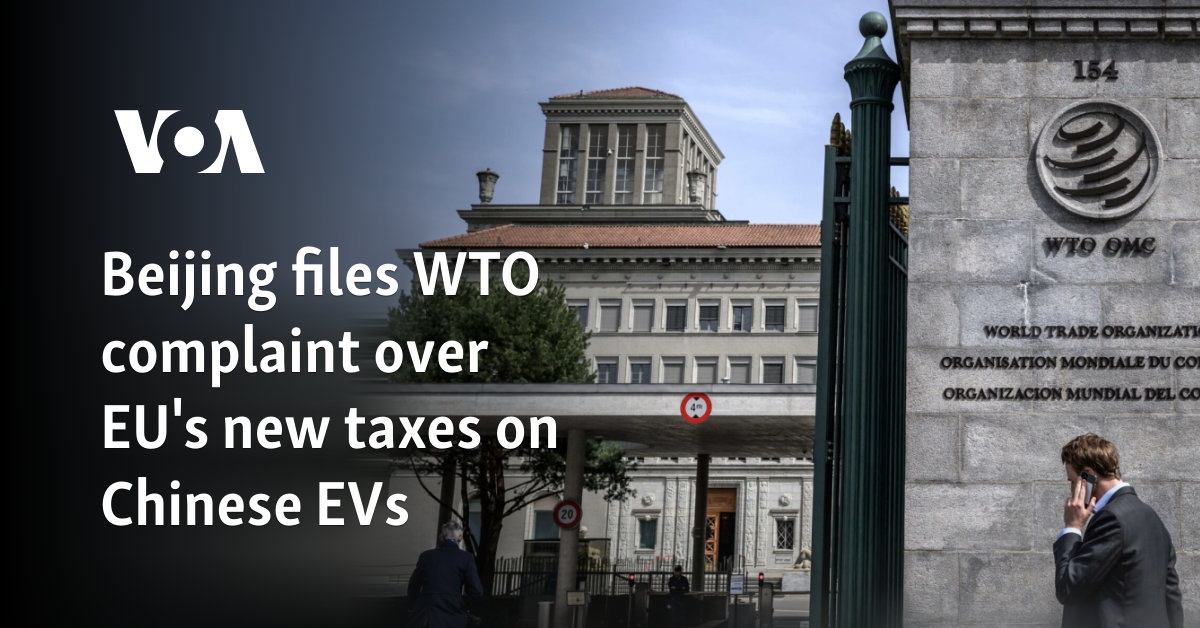Beijing files WTO complaint over EU’s new taxes on Chinese EVs

Beijing said Wednesday it had lodged a complaint with the World Trade Organization over the European Union’s decision to impose hefty tariffs on Chinese-made electric cars.
The extra taxes of up to 35% were announced Tuesday after an EU probe found Chinese state subsidies were undercutting European automakers, but the move has faced opposition from Germany and Hungary, which fear provoking Beijing’s ire and setting off a bitter trade war.
China slammed Brussels’s decision on Wednesday morning, saying it did not “agree with or accept” the tariffs and had filed a complaint under the World Trade Organization’s (WTO) dispute settlement mechanism.
“China will… take all necessary measures to firmly protect the legitimate rights and interests of Chinese companies,” Beijing’s commerce ministry said.
EU trade chief Valdis Dombrovskis said Tuesday that “by adopting these proportionate and targeted measures after a rigorous investigation, we’re standing up for fair market practices and for the European industrial base.”
“We welcome competition, including in the electric vehicle sector, but it must be underpinned by fairness and a level playing field,” he said.
But Germany’s main auto industry association warned the tariffs heightened the risk of “a far-reaching trade conflict,” while a Chinese trade group slammed the “politically motivated” decision even as it urged dialogue between the two sides.
The duties will come on top of the current 10 percent on imports of electric vehicles from China.
The decision became law following its publication in the EU’s official journal on Tuesday, and the duties will enter into force from Wednesday.
Once they do, the tariffs will be definitive and last for five years.
The extra duties also apply, at various rates, to vehicles made in China by foreign groups such as Tesla, which faces a tariff of 7.85%.
Chinese car giant Geely — one of the country’s largest sellers of EVs — faces an extra duty of 18.8%, while SAIC will be hit with the highest at 35.3 percent.
Ailing companies
The tariffs do not have the support of the majority of the EU’s 27 member states but in a vote early this month, the opposition was not enough to block them, which would have required at least 15 states representing 65% of the bloc’s population.
The EU launched the probe in a bid to protect its automobile industry, which employs around 14 million people.
France, which pushed for the investigation, welcomed the decision.
“The European Union is taking a crucial decision to protect and defend our trade interests, at a time when our car industry needs our support more than ever,” French Finance Minister Antoine Armand said in a statement.
But Europe’s bigger carmakers, including German auto titan Volkswagen, have criticized the EU’s approach and have urged Brussels to resolve the issue through talks.
The extra tariffs are “a step backwards for free global trade and thus for prosperity, job preservation and growth in Europe,” the German Association of the Automotive Industry’s president Hildegard Mueller said on Tuesday after the announcement.
Volkswagen, which has been hit hard by rising competition in China, has previously said the tariffs would not improve the competitiveness of the European automotive industry.
That warning came weeks before the ailing giant announced plans on Monday to close at least three factories in Germany and cull tens of thousands of jobs.
Retaliatory moves
Talks continue between the EU and China, and the duties can be lifted if they reach a satisfactory agreement, but officials on both sides have pointed to differences.
Discussions have been focused on minimum prices that would replace the duties and force carmakers in China to sell vehicles at a certain cost to offset subsidies.
“We remain open to a possible alternative solution that would be effective in addressing the problems identified and WTO-compatible,” Dombrovskis said.
The Chinese Chamber of Commerce to the EU urged Brussels and Beijing “to accelerate talks on establishing minimum prices and, ultimately, to eliminate these tariffs.”
The EU could now face Chinese retaliation, with Beijing already saying on October 8 it would impose provisional tariffs on European brandy.
Beijing has also launched probes into EU subsidies of some dairy and pork products imported into China.
Trade tensions between China and the EU are not limited to electric cars, with Brussels also investigating Chinese subsidies for solar panels and wind turbines.
The EU is not alone in levying heavy tariffs on Chinese electric cars.
Canada and the United States have in recent months imposed much higher tariffs of 100 percent on Chinese electric car imports.
Related
A New Book Argues That What Happens in Europe Doesn’t…
Remaking the World: European Distinctiveness and the Transformation of Politics, Culture, and the Economy by Jerrold Seigel “No issue in world
Poland plans military training for every adult male amid growing…
Poland’s prime minister, Donald Tusk, has said his government is working on a plan to prepare large-scale military training for every adult male in response t
2025 European Athletics Indoor Championships: Ditaji Kambundji secures women’s 60m…
Switzerland’s Ditaji Kambundji walked away from the 2025 European Athletics Indoor Championships in Apeldoorn on 7 March with much more than her first Europea
Takeaways from the EU’s landmark security summit after Trump said…
BRUSSELS (AP) — European Union leaders are trumpeting their endorsement of a plan to free up hundreds of billions of








